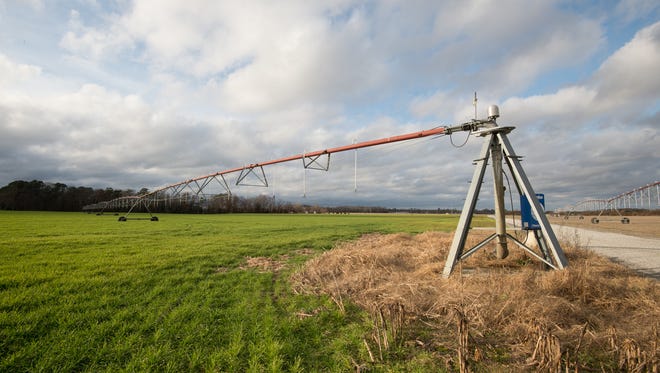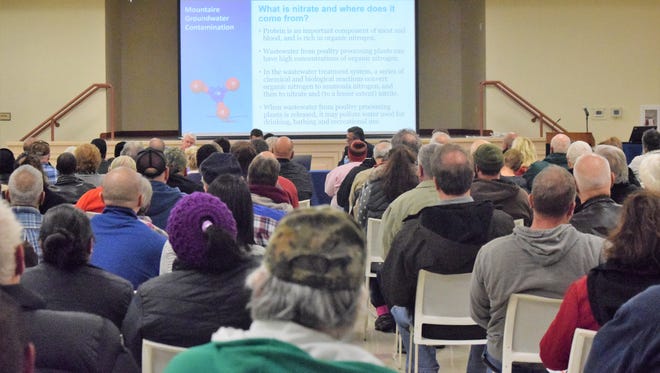Mountaire Farms: Tainted neighborhood wells not our fault
 Maddy Lauria
Maddy Lauria
Mountaire Farms and elected officials say they do not believe recent problems at its Millsboro-area chicken plant’s wastewater facility are to blame for high nitrate levels in neighbors’ wells.
“We do not believe that the upset condition (wastewater treatment problems) at Mountaire Farms that occurred increased the nitrate levels in local wells,” Mountaire Executive Vice President of Processing Operations Michael Tirrell said at a public meeting Wednesday night at the Indian River Senior Center. “And the science will back that up.”

That claim was met by silence from more than 100 people attending the first meeting held by company and state officials since it was discovered the plant had been discharging highly polluted wastewater on nearby farm fields.
Tirrell added that the company is willing to pay for drilling deep wells on property of owners worried about contaminated groundwater because Mountaire wants to be "good neighbors."
A few people laughed after Mark Eisner, hydrogeologist and president of Baltimore-based Advanced Land and Water Inc., said he also did not believe the plant’s wastewater problems have impacted nearby drinking water wells, and that he would “be heartened” by the company’s offer to drill new, deeper wells.
“You would have to go back to precolonial forests to truly find a time when nitrates in groundwater in Sussex County were not at some measure elevated,” Eisner said. “There’s no basis to believe the upset has at all affected groundwater quality in the area of these homes.”
Barry Rogers, who has lived on Walt Carmean Road off Del. 24 his whole life, found that explanation incredulous.
“We never had this problem before," said Rogers. "And all of a sudden you’re telling us you want to be a good neighbor. You want to be a good neighbor and you’re saying you will give us an hour and a half of your time. How long have you known about this?”
Rogers slammed state Rep. Rich Collins, R-Millsboro, who attended the meeting. He felt the lawmaker should have met earlier with constituents.
“We pay for you to sit up there in the damn office,” Rogers shouted. “This is sick.”
Collins also noted that nitrates have long existed in groundwater throughout Sussex County, adding that "there's been a lot of hysteria generated" in the wake of the pollution disclosure by Mountaire. "I think some good will come out of this eventually," he said.
“The upset” was discovered by Mountaire officials in August, Tirrell told The News Journal on Tuesday. They found a build-up of solids in the lagoons used to break down wastewater from processing chickens and the plant’s restrooms. Solids, including animal waste and fat, had even reached the final treatment step – the storage lagoon – which is supposed to hold clean water before it is sprayed onto more than 900 acres of surrounding farm fields.
Once Mountaire Farms found the problem, they contacted the Department of Natural Resources and Environmental Control and brought in outside companies to help get the plant back on track, company officials told The News Journal Tuesday.
DNREC Secretary Shawn Garvin told Millsboro-area residents Wednesday night that the state agency is still investigating what failed at the poultry processing plant. It discharged wastewater with high levels of nitrates and fecal coliform bacteria – at levels up to 5,500 times the legal limit – for months before Mountaire officials said they discovered the problem, according to data outlined in a 20-page violation notice issued by DNREC in early November.
“We will continue to work with the company, continue to share with you information as it gets developed, and at the conclusion of our investigation, whatever action we will take,” Garvin said.

Tirrell said on Tuesday that the company also fired the employees overseeing the wastewater process. He declined to say how many people were fired. And he said it was unclear how long the solids built up before the 'upset' occurred.
By the time company officials discovered the problem, it was at a “tipping point,” Tirrell said. So much solid waste had built up in the lagoons that there wasn’t enough room for the wastewater flowing out of the plant.
RELATED:Lawyers answer residents’ calls for information about Millsboro-area pollution
Since then, the company has been using a backhoe and dump trucks to scoop the solids from the two existing lagoons and transport it to out-of-state disposal sites. Oxygen has been injected into the wastewater process to help the bacteria break down the solids in the water.
“We’re rehabilitating the system we have,” Tirrell said. He said Mountaire also ramped up monitoring to include daily testing and bi-weekly reports to DNREC.
Increased monitoring of wastewater was one of the requirements included in a Nov. 2 violation notice issued to the plant after state regulators found that “the upset” resulted in Mountaire spraying highly contaminated effluent on the nearby farm fields.
The notice also outlines the company’s failure to report non-compliance, and that the plant inappropriately diverted wastewater from the clarifiers directly to the spray irrigation pivots. Tirrell said that diversion was necessary because solids had reached the end of the treatment line – the storage lagoon, where they are not supposed to be.
Now the company is seeking a permit to reopen an old storage lagoon on the banks of Swan Creek, a tributary of the Indian River. The plan is to empty out the two clogged lagoons, dump the waste in the temporary storage lagoon and then send it somewhere else for disposal, Tirrell said.
A public hearing on the sludge storage permit is set for 6 p.m. Tuesday at the Millsboro Town Hall.
In the meantime, Mountaire is designing a new wastewater treatment facility with additional tanks to handle the flow. The company currently is permitted to spray up to 2 million gallons per day of treated wastewater on fields covered in crops such as corn, soybeans, and wheat.
Tirrell estimated it will take at least two years for that plant to come online. Mountaire has not applied for any permits for the facility, which will be located on the same footprint as the existing plant in Delaware’s Coastal Zone.

The company also provided bottled water, water treatment systems and has offered to dig deeper wells for dozens of nearby residents, who they will meet with for the first time since the violations were noticed. That meeting is set for 6 p.m. Wednesday at the Indian River Senior Center in Millsboro.
While company officials admit there were serious problems with the wastewater treatment process, they have repeatedly said they do not believe those issues led to the high nitrate levels found in drinking water wells to the west.
RELATED:Millsboro neighbors: How long have we been drinking tainted water?
Attorney Michael Parkowski, representing Mountaire, said Sussex County is known to have historically high nitrate levels in its groundwater. Improper disposal of poultry waste, excess fertilizer applied to feed corn crops and ongoing issues with septic systems and cesspools are more likely to blame for contaminated groundwater, he said.
In addition, groundwater flow models show the water generally moves from north to south toward the Indian River. A 2010 model shows groundwater from Mountaire’s spray operations generally moves south and southeast, not to the west where many residents have found their wells to contain nitrates far above the safe drinking water standard of 10 milligrams per liter.
He said a DNREC expert estimated groundwater flows at a rate of about 50 feet per year, or less than half a foot per day.
However, hydrogeologist Scott Andres with the University of Delaware's Delaware Geological Survey told The News Journal in a December interview that groundwater typically flows at a rate of about 1 to 3 feet per day. And if there is a significant rain event – or additional water from spray irrigation – added to the natural system, groundwater could move much more quickly.
“Think of it like a pipe,” he said. “The more pressure you build up, the faster it will move.”
Andres said nitrate pollution in the area has been around for a long time, and data from when Townsend owned the plant showed high levels of nitrates in the groundwater.

“As we’ve looked at the impacts of agriculture and wastewater disposal from domestic septic systems, there is a substantial amount of nitrogen in the ground from those practices that’s been there for 40-50 years,” he said. “It’s going to be there for another 40-50 years even if we stop putting it on the ground today.
"Is it from Mountaire? Is it from the farm field a mile away that grew corn for 50 years? I don’t know. That’s a really tough one. You’d have to spend some time and energy and collect a lot more information to be able to prove the link.”
That’s just what lawyers are planning to do. Two Delaware firms are investigating the groundwater contamination separately, and working with law firms from Baltimore and Washington, D.C., to collect clients and file possible lawsuits against Mountaire.
“We want to resolve this,” Tirrell said. “We live here. We’re not coming in and then leaving. We want to be good neighbors.”
Contact reporter Maddy Lauria at (302) 345-0608, mlauria@delawareonline.com or on Twitter @MaddyinMilford.